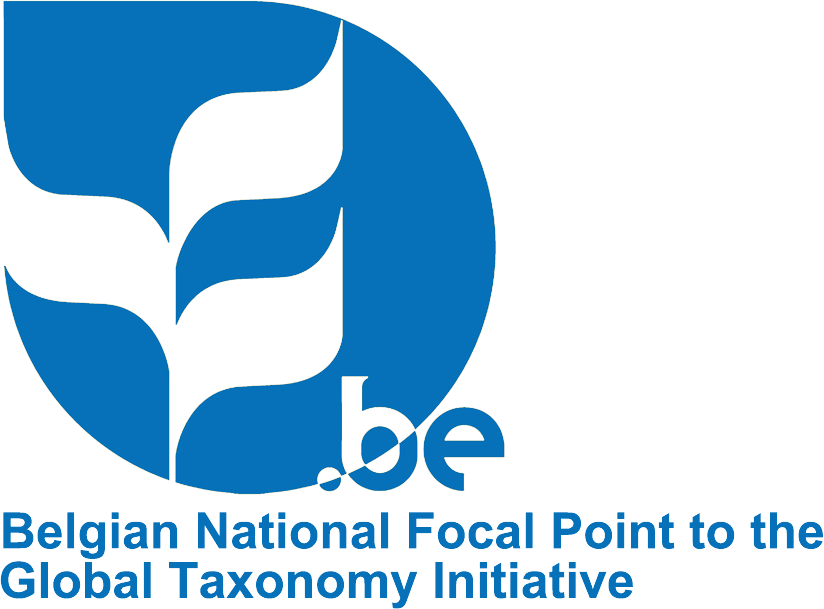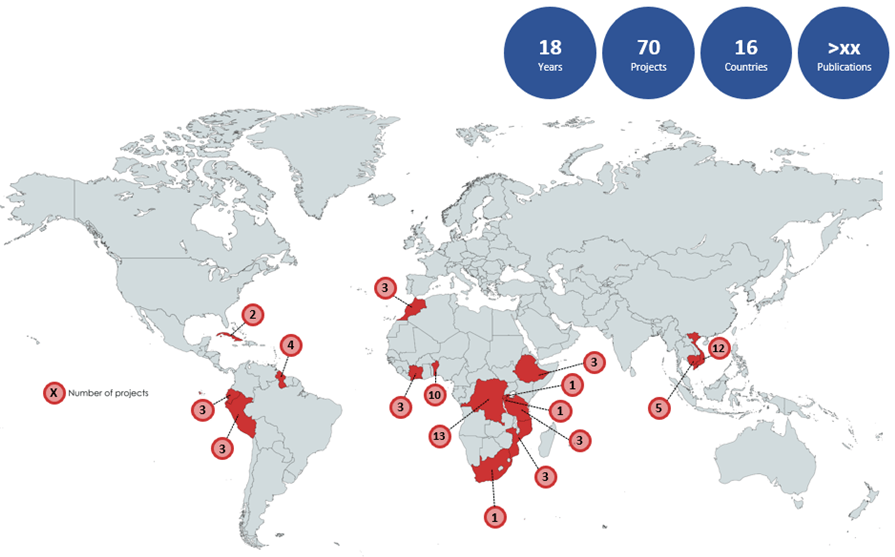GTI Capacity Development Projects
The Belgian National Focal Point to the GTI aims to strengthen the taxonomic capacities of researchers from partner countries of the Belgian Development Cooperation, not only by funding short-term scholarships for training in Belgium (see here), but also by awarding grants to Belgian taxonomists carrying out capacity development projects in developing countries to train students and scientists on the ground, combined with research activities.
Home » Specific Training » Capacity Development Projects
About the GTI Capacity Development Grant
GTI Capacity Development Grants support taxonomic research projects of Belgian scientists (see note) in eligible developing countries. Projects should focus on well-defined taxonomic groups that play an important role in ecosystem functioning and the delivery of ecosystem services, in order to support sustainable ecosystem management and sustainable livelihoods of local communities.
Importantly, research activities must always be accompanied by capacity-development activities and both components should address clearly identified taxonomic and/or curatorial needs of the partner country.
Note: All scientific staff of the Institute of Natural Sciences are welcome to respond to this call. Researchers from Meise Botanic Garden can also apply, provided that they have actively contributed to GTI activities in the past. Taxonomists from other Belgian research institutes can take part as invited experts, not as promotors.
Grants awarded in the past
During the period 2004-2021, 70 grants were awarded for the implementation of Capacity Development Projects in 16 different countries.
Eligibility criteria
All scientific staff of the Institute of Natural Sciences are welcome to respond to this call; priority will be given to researchers who have trained interns from partner countries in last five years under the GTI Short-term Scholarship Programme. In addition, scientists from Meise Botanic Garden can also apply, provided that they have actively contributed to GTI activities in the past (e.g., training of GTI interns in Belgium). Belgian universities and/or other Belgian research institutes may take part as co-promotors, associates or invited experts (not as promotors).
Projects must take place in one (or more) of the following countries:
Benin* – Burkina Faso* – Burundi* – Cabo Verde – Cambodia – Cote d’Ivoire – DR Congo* – Gambia – Ghana – Guinea* – Guinea Bissau – Kenya – Laos – Liberia – Mali* – Morocco* – Mozambique* – Niger* – Nigeria – Palestinian Territory* – Senegal* – Sierra Leone – Tanzania* – Thailand – Togo – Uganda* – Vietnam.
Projects with activities planned in official partner countries of the Belgian Development Cooperation (indicated with an asterisk in the above list) will be given priority, even more so if these activities will be carried out in collaboration with a scientific institute with which CEBioS/the Belgian GTI-NFP has a privileged relationship (institutional cooperation). These institutes are:
- Université d’Abomey-Calavi (UAC, Benin);
- Université de Parakou (Benin);
- Institut de Recherches Halieutiques et Océanologiques du Benin (IRHOB);
- Office Burundais pour la Protection de l’Environnement (OBPE, Burundi);
- Centre de Surveillance de la Biodiversité (CSB, DR Congo);
- Institut Congolais pour la Conservation de la Nature (ICCN, DR Congo) with implementation of activities by Congolese scientific institutes.
As far as the content of the projects is concerned, there are no limitations as to the taxonomic group(s) that can be studied. However, the targeted organisms should play an important role in ecosystem functioning and the delivery of ecosystem services so that the project can contribute in the medium or long term to sustainable ecosystem management and sustainable livelihoods of local communities in support of the achievement of the UN Sustainable Development Goals and the targets of the Global Biodiversity Framework of the Convention on Biological Diversity. The project should show interlinkages among biodiversity, water, food, climate and health (nexus).
Sampling must respect local and national regulations, and sample exports must comply with ABS legislation and the Nagoya Protocol. The “Build your ABS Strategy” checklist of the German Nagoya Protocol HuB provides guidance on the topic.
Additionally, research activities must at all times be accompanied by several days of capacity-development activities – either in the partner country itself or in Belgium if relevant– to enhance the taxonomic and curatorial knowledge and/or skills of the local students/researchers (e.g., a training in field sampling techniques, species identification, collection management, …).
Both the research and capacity-development component should respond to clearly identified taxonomic and/or curatorial needs of the partner country/institute. Therefore, an endorsement letter from the local partner(s) is requested along with the project proposal, clearly stating how the collaboration will benefit the local institute in terms of addressing gaps in its taxonomic/curatorial system and in the taxonomic knowledge, skills, etc. of its staff/students.
Moreover, projects with a multi-disciplinary approach are encouraged. They may, for example, complement initiatives or programmes that are already operational (even if carried out by other institutes or funded by other countries/organisations).
Finally, women empowerment and gender equality are key in the presentation and implementation of projects. CEBioS will pay particular attention to this crucial component.
Application documents
Please use the official application form, which is available in English and French, when completing your project proposal. For proposals in French, a project summary in English is mandatory.
Application form Capacity Development Project EN
Application form Capacity Development Project FR
Application forms must be accompanied by:
(1) A detailed budget that shows how support of CEBioS will be spent.
- Budget proposals must be prepared according to the obligatory Excel template and should follow the CEBioS vademecum guidelines
- The maximum allocated budget per project is € 20,000, divided as follows:
- A maximum of € 7,000 that can be spent on “Missions”: plane tickets to the partner/project country, visas, medical costs, accommodation, costs related to export permits (Nagoya protocol), per diems, etc. of Belgian and other organising/supporting staff;
- A maximum of € 13,000 that can be attributed to “Operations”: small equipment (for fieldwork, laboratory, lecture room), organisation of research & capacity-building activities (local transport, guides, permits/entrance fees, preparations for conferences/ceremonies, communication, travel expenses/accommodation/per diem of local researchers and students, etc.), and certain analyses (e.g., DNA sequencing).
- Please note that this type of grant does not aim to finance infrastructure (buildings, cars, etc.); only support for training material and small equipment will be considered
- It must further be noted that the Belgian researchers are subject to the normal rules of the Institute’s accountancy (and mission procedures)
(2) A signed letter of endorsement by the partner institute(s) in the South. This letter must clearly state how the collaboration answers the needs of the partner institute and how it will contribute to capacity building of its staff/students.
(3) A proof of co-financing of the project (optional). Co-funding by Belgian, local or other organisations is encouraged but not mandatory.
Complete applications should be sent electronically to cbd-gti[at]naturalsciences.be. CEBioS will send an acknowledgment of receipt.
If you would still have unanswered questions or in case of problems with filling out the application form, you can email us using the same address above.
Note that applications are only possible when the call is open. Please check the Open Calls page to stay up to date on active calls. The selection of the projects will only be communicated after CEBioS funding is secured for the 2024-2029 phase.
Reporting
The narrative and financial reports of the projects must be submitted to CEBioS accountancy (vpinton[at]naturalsciences.be) and the Belgian GTI-NFP (cbd-gti[at]naturalsciences.be) at the latest two months after the last mission of the project.
For the narrative report, please use the official template. If changes have been made to the originally planned activities, the project (co-)promotor(s) should explain why.
The financial report must be submitted by means of the provided Excel template and must be accompanied by all supporting documents (copies of invoices, etc.).
Templates for narrative and financial reports will be provided to promotors of selected projects at the beginning of their implementation.
Project (co-)promoters are requested to provide CEBioS with all outputs (articles, abstracts, press communications, posters, links to video footage, …) and photos resulting from the project activities, which the CEBioS intends to use for outreach purposes. These outputs and photos should be made available through the partner country’s CHM website as well. Promoters and co-promoters are also asked to refer, whenever possible, to the financial support of the Belgian Development Cooperation, made available in the framework of the Belgian GTI under the CEBioS programme, in their communications and publications.
Contact
If you would still have unanswered questions, do not hesitate to contact:
Ir. Anne-Julie Rochette and Pierre Huybrechts
Capacities for Biodiversity and Sustainable Development (CEBioS)
Institute of Natural Sciences, Rue Vautier 29, 1000 Brussels, Belgium
Tel: + 32 (0)2 627 44 56
Mail: cbd‑gti[at]naturalsciences.be




